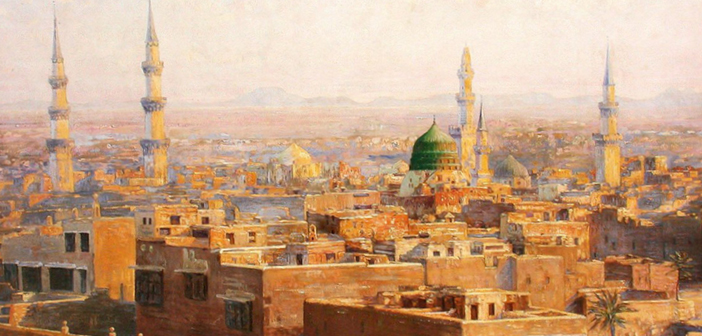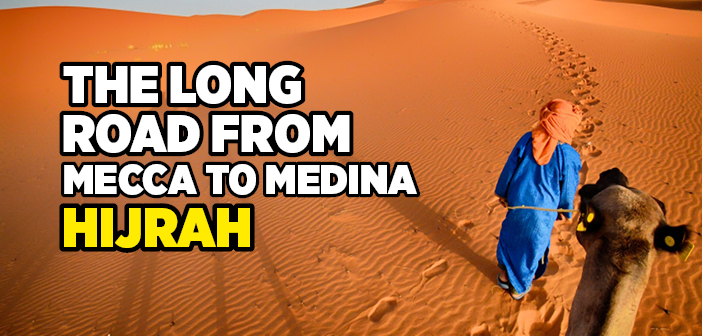The long awaited guest in madina: Hijrah
Excitement was at its height for the Medinans who had long received the news of the Prophet’s -upon him blessings and peace- impending arrival. They had gathered at the outskirts of the town in anticipation of the arrival of their blessed guest, in hope of welcoming the brilliant envoy and garner their share of blessing.
At long last, on Monday the 12th of Rabiulawwal,[1] the joyous shouts “They are coming!” were finally beginning to reverberate throughout Medina.
Enlivened by the good news, the streets of Medina were now resounding with the sounds of takbir. The Muslims took their arms. Mounted or on foot, they rushed to welcome their blessed guest.
With the arrival, under Divine protection and assistance, of the long awaited travellers at the nearby village of Quba, the whole town bubbled over, sent into blissful celebration.
The fervent tune of Talaa’l-bedru alayna[2] rising to the skies from the surrounding hills were setting hearts ablaze with joy. To register all events to take place thereafter until the Final Hour, history was meanwhile setting the Hegira calendar in motion.
As a majority of Muslims had never before seen the Light of Being -upon him blessings and peace- in their lives, they did not recognize him, and for a while took Abu Bakr Siddiq –Allah be well-pleased with him- to be the Prophet. The Noble Prophet -upon him blessings and peace- was in the meantime keeping quiet. He was directly exposed to the scorching heat of the sun, which was when Abu Bakr –Allah be well-pleased with him- made a move to shade him with his mantle. Only then did the Muslims realize the identity of the Prophet -upon him blessings and peace-.[3]
From that day on, Medina was to become the center and mirror of Islam’s development and progress. The dark face of disbelief was fading out more and more. Instilled with the sublime meanings of the Hegira, the Masjids of Medina and Quba have been left as living memories and legacies of this blessed journey until the Final Hour.
Laying all their belongings at the feet of the Muhajirun, the Ansar proclaimed:
“Here is my wealth…Half is yours!” The immeasurable sacrifice and devotion that is Muslim brotherhood was thus initiated there and then. Medina cemented her unshakeable place and reputation in Islamic history. All deeds of Islam, social and personal, and struggles became manifest in a unique way in Medina, setting an example for the rest of the ummah.
In Quba, the Blessed Prophet -upon him blessings and peace- was a guest at the house of Ibn Khidm, from the Amr ibn Awf clan. There, the Prophet -upon him blessings and peace- would occasionally leave and go to the house of Saad ibn Haythamah, where he would sit and talk with other Muslims. As Saad –Allah be well-pleased with him- was yet unmarried, the bachelors of the Migrants used to stay at his house, for which reason it came to be called Manzil’ul-Uzzab, the Place of Bachelors. (Ibn Hisham, II, 110; Ibn Saad, I, 233)
During his temporary stay at Quba, the Prophet -upon him blessings and peace- would attend funerals, invitations and visit the ill.
Abu Said al-Khudri –Allah be well-pleased with him- recalls the following from those days, which shows the sensitivity of the Companions.
“During the first days of the arrival of the Messenger of Allah -upon him blessings and peace- in Medina, we used to always notify him, whenever there would be someone on his deathbed. He would then come and wait by the person, praying for his forgiveness. Only after the person breathed his last would he return, sometimes waiting even until the burial.
Weary of causing him inconvenience, we said to each other:
‘Let’s not tell the Messenger of Allah anything until the ill person passes away. That way the Prophet will neither become tired nor will he lose any time.’
So we began telling the Messenger of Allah -upon him blessings and peace- about the deceased only after the person breathed his last. He would then come and perform the salat of the deceased and pray for his forgiveness, waiting at times until the burial.
We continued doing this for some time. Then thinking even that was causing inconvenience for the Prophet -upon him blessings and peace-, we decided to take the funeral to his doorstep, supposing it would be easier for him to perform the salat over the deceased like that. So that’s what we did from then on.”
Muhammad ibn Omar, the narrator of the above account, adds:
“Such is the reason why that place is now called Musalla, meaning the place where the salat (of the deceased) is performed. The funerals were always taken there and the practice continued even after the passing away of the Prophet -upon him blessings and peace-.” (Ibn Saad, I, 257, Hakim, I, 519/1349)
The Noble Prophet -upon him blessings and peace- had not yet departed from Quba when Ali -may Allah ennoble his countenance-, having returned to their owners the goods entrusted in the safekeeping of the Prophet -upon him blessings and peace-, caught up with them.
There are many reports that bear witness to the immensity of the love the Companions nurtured for the Noble Prophet -upon him blessings and peace- and his loving memory. Bara ibn Azib -Allah be well-pleased with him-[4] tells of his father’s insatiable desire to listen to something about the Prophet -upon him blessings and peace- at every given opportunity:
“Abu Bakr –Allah be well-pleased with him- had bought a saddle from my father for thirteen dirhams and told him:
‘Ask Bara to deliver it to our house if he can’.
‘Not until you describe to me how the Messenger of Allah migrated from Mecca to Medina’, my father replied.
Thereupon Abu Bakr –Allah be well-pleased with him- lengthily described their Hegira to Medina.” (Bukhari, Ashabu’n-Nabi, 2; Ahmad, I, 2)
[1] The date coincides with September, 622 on the Gregorian Calendar.
[2] The full moon has ascended upon us.
[3] Bukhari, Manaqibu’l-Ansâr, 45.
[4] Bara ibn Azib –Allah be well-pleased with him-, also known as Abu Ammara, was among the Ansar. He became Muslim before the Hegira and took active part in all the battles after Uhud. He breathed his last in Kufa, in the 73rd year of Hegira, having narrated more than 300 hadiths.
Source: Osman Nuri Topbaş, The Prophet Muhammed Mustafa the Elect, Erkam Publications
SIMILAR ARTICLES
- WHAT IS ISLAM?
- THE FAMILY TREE OF PROPHET MUHAMMAD SAW
- THE FIRST AQABAH PLEDGE
- FREE ISLAMIC BOOKS READ AND DOWNLOAD PDF
- PROPHET MUHAMMAD’S MIGRATION FROM MECCA TO MEDINA





